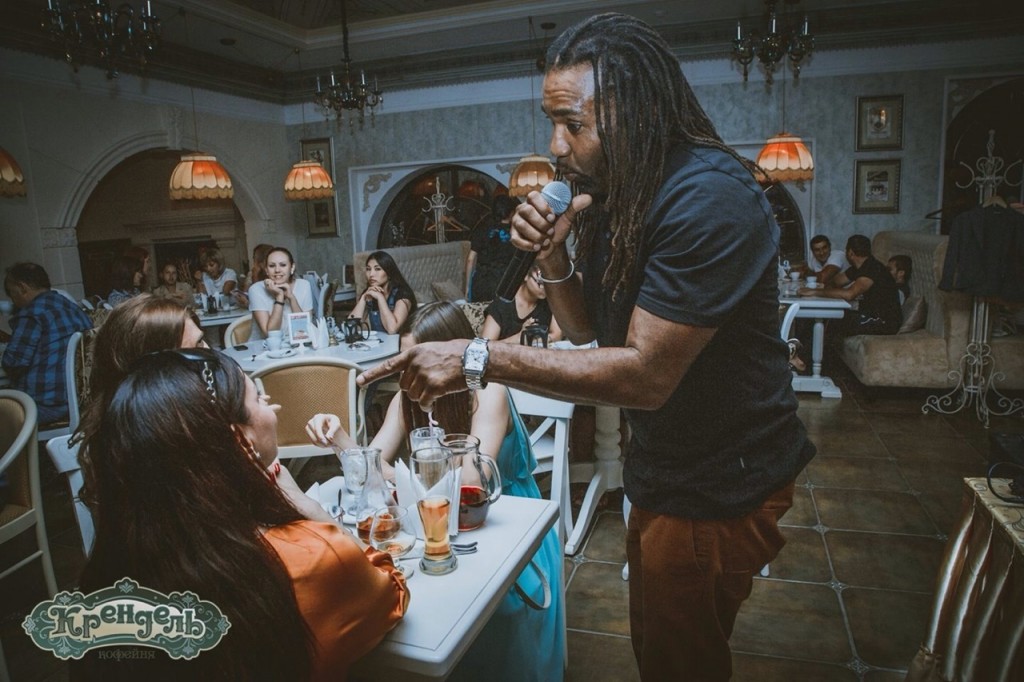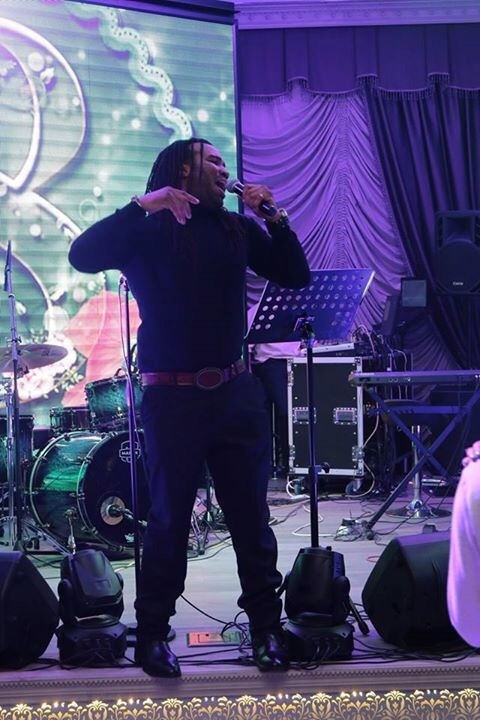ASTANA – Soul music is not the first thing that comes to mind when surveying Kazakhstan’s sound scene, but singer Mekiel Barnett has hopes that the country’s music fans will be as welcoming to him as the rest of its people have been.
You’d be forgiven for finding Barnett’s arrival on the steppe unexpected, to say the least. Born in Ohio, Barnett and his family moved to Israel when he was a child. He speaks English, Hebrew and Arabic and grew up singing gospel and Motown music – none of which immediately calls to mind the central Kazakh steppe. But wait.
“I was raised as part of a community of black Hebrews,” Barnett said in an interview in Astana. “We have been there now for almost 40 years. Most of my formal education – from 6 to 18 – [was] in Israel. … My music started in Israel.”
Music, in fact, became a major feature of the black Hebrew identity. “Music was all around me all my life, from when I was little. That’s the way we fed ourselves,” Barnett explained.
“Music was part of our lives … as we grew up, we ended up joining different Israeli bands. Now, most of our community has citizenship and our kids are in the army, [but for a long time], we weren’t legally in the country. We were denied citizenship for over 30 years, 25 years. So we went through struggles around that – we were given different temporary types of residency, but we weren’t allowed fully to belong. So during those years … it was kind of rough, but music was our way of expression.”
Black Hebrew groups have been established by African American communities in the United States since the 19th century. Different organisations have different specific beliefs, but many believe themselves to be blood descendants of the Jewish prophet Abraham and therefore of the biblical tribe of Judah, which can claim Israel as an ancestral homeland. Over the last decade or so, black Hebrews have begun receiving permanent resident status and even citizenship in Israel. Eddie Butler, a black Hebrew singer, even represented Israel in the 2006 Eurovision Song Contest.
None of this, of course, would seem to point the way toward Islam and the steppe, but it will. But first, we have to return to the United States, and then to Prague, and meet Barnett’s son and inspiration. It’s a global story.
As a young adult, Barnett returned to the U.S., where for 18 years he worked in education and psychology, running group homes. After nearly two decades away from Israel and the son he had there, he got a call that would change his life.
“Somebody called me and said ‘Your son’s in Prague. He’s doing music,’” Barnett said. He lit out to find him. “And he was living the dream that I had dreamed, although life had taken me in another direction,” Barnett explained. “It brought tears to my eyes, but it inspired me. It gave me a new breath of life. It made me want to reach for music. And … I packed my apartment up and I got my passport … within two years, I was ready to make a move.”
Seeing his adult son was like a punch to the gut, Barnett said. “He’s so much like me. When I was younger that’s what I wanted to do: I wanted to sing and write, it was inside of me. But you know how life is, it takes you in different directions.”
Having rediscovered his direction, Barnett headed back to Israel – and now we find the musical connection that would lead him to Kazakhstan: “I stayed in Israel for about eight months, coming back and forth. And then a friend of mine had a job in Kazakhstan, and he couldn’t go,” he said.
It turns out that a Pavlodar-born Israeli citizen, Larson Davidoff, a saxophone player, has been returning to Kazakhstan every year for the past 15 years or so to perform, Barnett said. In the winter of 2013–2014, Barnett came to Kazakhstan with Davidoff to perform. They played at the Ramada Plaza in Astana for a few nights, and at the grand opening of the Krendel Cafe in the capital – where Barnett met Inga Bespalova of Pavlodar, who, with her mother, owns Krendel cafes in Astana and Almaty. “I met them here and I fell in love with Inga,” Barnett said. After a final six months in Israel, Barnett returned to Kazakhstan, where he’s working on his first album with Davidoff in Pavlodar.
“I’ve got about seven songs written,” he said, mostly R&B and soul, though he crosses genres. “Some of my stuff has a jazz [sound]. I do pop. It’s just me, it’s my expression.” The singer is confident his expression will find listeners here – and beyond. “I think I’m going to be heard,” he said. “[And[ I don’t only want to be heard here, I want to be heard all over the world.”
He and Davidoff are working together on Barnett’s first album in Pavlodar at the moment, with Davidoff providing saxophone segments. They have four songs done, Barnett reported in June, and he hopes to be finished by the end of the year.
As for how a black Hebrew might fit in to Kazakh culture, Barnett says there are more connections than meet the eye. “I was raised around Muslims, I was raised with Palestinians,’ he said. “I’ve got Muslim friends, I speak Arabic, I was raised in a dual society. I understand Muslims, and Jews. So I understand both traditions, cultures, belief systems. So therefore, I can fit.”
So, the traveller is now settling into a new continent, and working on a new language, Russian. “I’m coming in, learning a different culture. The people are different; the people are good people,” he said.
The weather, for the American-Israeli, is not as welcoming. “When I first got here, we landed and they were like, ‘It’s minus 20, it’s a good day!’ and I thought ‘Twenty below is a good day? What have I done? Where am I?’”
But he intends to appreciate the beauty of the steppe, despite the chill. As Barnett said in an interview with Kazakh writer Nelly Kalashnikova in May, “I like the whole world. … I would like us to learn to live with this beauty, which is us, the beauty of the differences. It would be very beautiful world, and we would be much stronger.”

